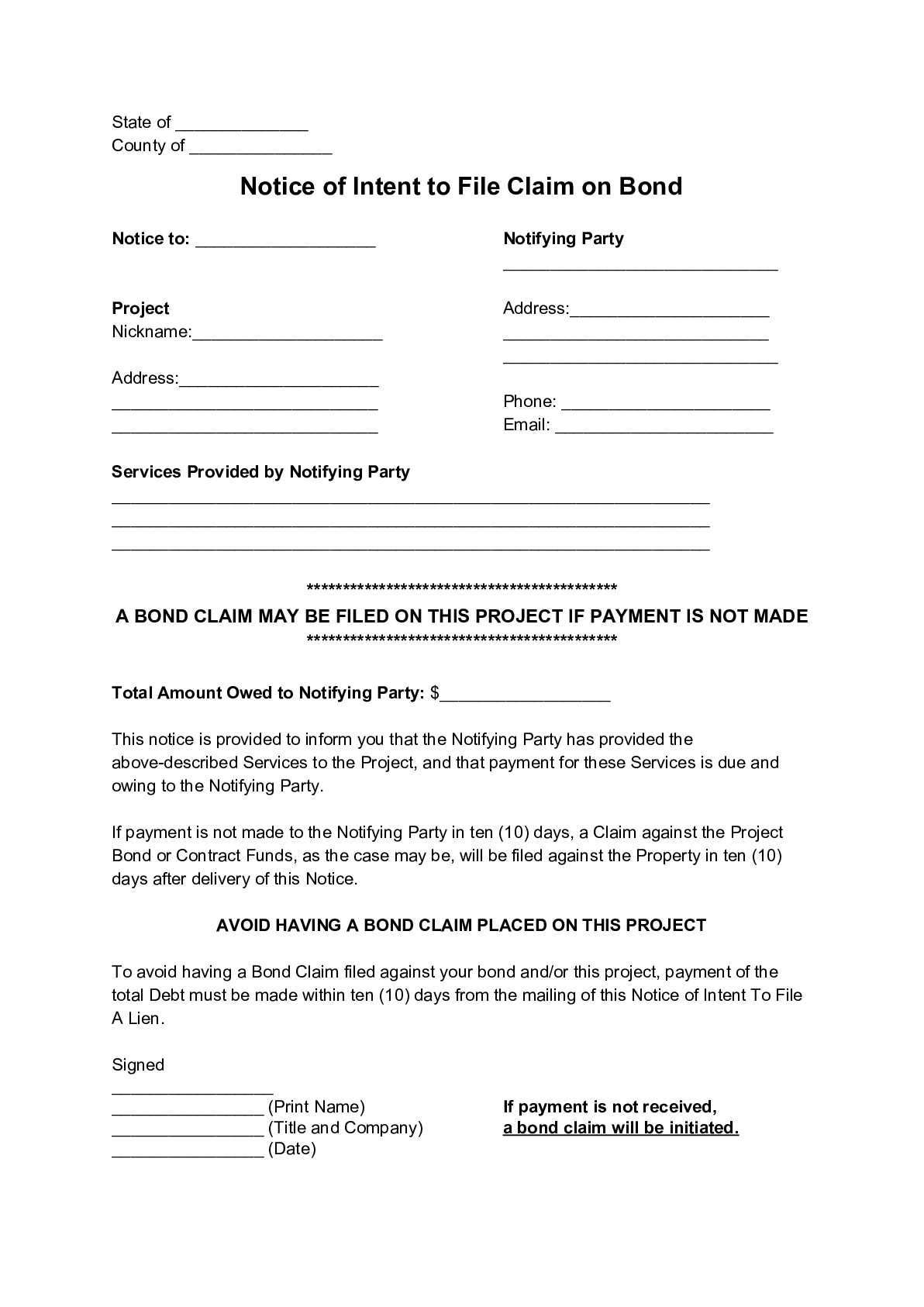Delaware
Preliminary Notice Deadlines
Delaware
Delaware
Delaware
Delaware
Delaware
No formal filing requirement, although may benefit from filing a formal notice of claim against the bond with the surety. Such notice filing would initiate the bond claims process, which may eliminate the need to file litigation. However, a lawsuit to enforce bond claim due within 1 or 3 years from project completion. It’s 1 year if the bond contract restricts it to one year (likely), and otherwise, 3 years.
Delaware
Delaware
No formal filing requirement, although may benefit from filing a formal notice of claim against the bond with the surety. Such notice filing would initiate the bond claims process, which may eliminate the need to file litigation. However, a lawsuit to enforce bond claim due within 1 or 3 years from project completion. It’s 1 year if the bond contract restricts it to one year (likely), and otherwise, 3 years.
In Delaware, parties who furnish labor and/or materials to the general contractor are entitled to make a bond claim. If the language of the bond does not explicitly allow for parties contracting with a subcontractor to make a claim on the bond, those parties are not protected.


There is no formal filing requirement to make a bond claim in Delaware, and parties entitled to protection may proceed directly to suit. However, it may be beneficial to give a notice of claim on the bond to the surety to initiate the bond claim process, and to potentially avoid the need to file litigation.


N/A. However, if claimant so chooses, notice of the bond claim may be given to the surety.


Delaware statute provides that a bond claim may be initiated within 3 years of the final work performed on the entire contract. However, if the bond itself provides that suit must be initiated within 1 year after final work on the contract (which is likely) that provision will control.


N/A. If the claimant decides to give notice to the surety, it may be advisable to include the amount of the claim, a description of the project and the labor and/or materials furnished, and an identification of the public entity, general contractor, and claimant.


N/A


My payment is way past due. Subcontractor says they have not been paid yet. How do I have to wait to be paid?


A Notice of Intent to Make Bond Claim is not a required document, but it can be a powerful one. By sending this notice, a claimant...
When you perform work on a state construction project in Delaware, and are not paid, you can file a “lien” against the project pursuant to Delaware’s Little Miller Act. Since the claim is not against the state or county’s actual property, but instead against a posted bond, the claim is not really called a “lien” but is more frequently referred to as a “bond claim” or “little miller act claim.”
Delaware’s Little Miller Act is found in Delaware’s Code, Title 29, Chapter 69, Sub-chapter IV, Public Works Contracting, § 6962, and is reproduced below.
(a) Applicability. — Any state contract for which an agency is a party and for which the probable cost is greater than the amount set by the Contracting and Purchasing Advisory Council pursuant to § 6913 of this title for small public works contracts shall be subject to the provisions of this section [View Current Threshold Set by Contracting and Purchasing Advisory Council On Their Website].
***
(d) Bid specifications and plans requirements. —
(8) Bid bonding requirements. —
a. All bids shall be accompanied by a deposit of either a good and sufficient bond to the agency for the benefit of the agency, with corporate surety authorized to do business in this State, the form of the bond and the surety to be approved by the agency, and the bond form used shall be the standard form issued by the Office of Management and Budget for this purpose or a security of the bidder assigned to the agency, for a sum equal to at least 10% of the bid. The bid bond need not be for a specific sum, but may be stated to be for a sum equal to 10% of the bid to which it relates and not to exceed a certain stated sum, if said sum is equal to at least 10% of the bid. Any bid which, at the time it is submitted, is not accompanied by a bid bond or sufficient security as required by this paragraph shall not be opened or read, and shall be rejected.
b. Upon the execution of a formal contract and performance bond, the bid bond or security shall be returned to the successful bidder. The security of the unsuccessful bidders shall be returned to them immediately upon the awarding of the contract or the rejection of all bids, but in no event later than 30 days after the opening of bids with the exception of school districts and the Department of Public Instruction, which shall be no more than 60 days unless the contracting agency or school district extends the bid evaluation period by 5 working days per the requirements of paragraph (d)(13)a. of this section. If the bid evaluation period is extended by 5 working days, then the security of each unsuccessful bidder shall be returned to them on the first working day after the end of the extended bid evaluation period.
c. Loss of bid bond as damages. — In the event of any successful bidder refusing or neglecting to execute a formal contract and bond within 20 days of the awarding of the contract, the bid bond or security deposited by the successful bidder shall be taken and become the absolute property of the State for the benefit of the agency as liquidated damages. Such damages shall neither constitute a forfeiture nor a penalty and shall be deposited with the Secretary of Finance. Such monies pertaining to Department of Transportation contracts shall be deposited in the Transportation Trust Fund. The contracting agency may award the contract to the next lowest responsible bidder or re-advertise for new bids.
d. In the case of bids submitted to agencies other than any county of this State and other than any public school district, wherever security is required under this section, the vendor shall also supply with its bid its taxpayer identification number (i.e., federal employer identification number or social security number) or a Delaware business license number and, should the vendor be awarded a contract, such vendor shall provide to the agency the taxpayer identification or Delaware business license numbers of such subcontractors. Such numbers shall be provided on the later of the date on which such subcontractor is required to be identified or the time the contract is executed. The agency shall report to the Division of Revenue each vendor selected for award within 15 days of execution of the contract and each subcontractor within 15 days of such contractor having been identified to the agency or on the date of execution of the contract, whichever is later, unless the Director of the Division of Revenue has notified the agency of criteria according to which, in the Director’s discretion, reporting is not required and the contract meets such criteria.
(9) Performance bonding requirements. –
a. Simultaneous with the execution of the formal contract, the successful bidder shall also execute a good and sufficient bond to the contracting agency for the benefit of the agency, with corporate surety authorized to do business in this State, in a sum equal to 100% of the contract price and the bond form used shall be the standard form issued by the Office of Management and Budget.
b. The bond shall be conditioned upon the faithful compliance and performance by the successful bidder of each and every term and condition of the contract and the proposal and plans and specifications thereof, at the time and in the manner prescribed by the contract and the plans and specifications, including the payment in full, to every firm furnishing materiel or performing labor in the performance of the contract, of all sums of money due it for such labor or materiel. The bond shall also contain the successful bidder’s guarantee to indemnify and save harmless the agency from all costs, damages and expenses growing out of or by reason of the successful bidder’s failure to comply and perform the work and complete the contract in accordance with the contract.
c. The agency may, when it considers that the interests of the agency so require, cause judgment to be confessed upon the bond. All sums received through confession of judgment shall be paid for the credit of the agency to the Secretary of Finance or to the chief financial officer of the agency if it is not a state agency.
d. Every firm furnishing materiel or performing labor under the contract for which the successful bidder is liable may maintain an action on the bond for its own use in the name of the agency in any court of competent jurisdiction for the recovery of such sum or sums as may be due such firm from the successful bidder, but if the bond so provides, no suit shall be commenced after the expiration of 1 year following the date on which the successful bidder ceased work on the contract. Otherwise, suits may be commenced at any time within 3 years following the date the last work was done on the contract.
e. No firm or surety, in any action brought under this section, or on the bond required by this section, shall assert as a defense to such action the claim that the bond given pursuant to this section contained a limitation or restriction not provided for by this section.
f. In the event of defaults of its contracts, the money collected on the performance bonds shall be utilized by the contracting agency for the projects for which the performance bonds were issued. All performance bond proceeds received shall be deposited with the Secretary of Finance for the credit of the agency. Such monies pertaining to Department of Transportation contracts shall be deposited in the Transportation Trust Fund.
g. In addition to the bond, letter of credit or other financial security posted by the successful bidder in conjunction with the execution of the formal contract, each successful bidder, regardless of the type of the security posted or waived, as the case may be, must purchase adequate insurance for the performance of the contract and, by submission of a bid, does agree to indemnify and save harmless and to defend all legal or equitable actions brought against the agency or officer or employee of the agency for and from all claims of liability which is or may be the result of the successful bidder’s actions during the performance of the contract. The purchase or nonpurchase of such insurance or the involvement of the successful bidder in any legal or equitable defense of any action brought against the successful bidder based upon work performed pursuant to the contract shall not waive any defense which the agency and its officers and employees might otherwise have to such claims, specifically including the defense of sovereign immunity, where applicable, and by the terms of this section, the agency and its officers and employees shall not be financially responsible for the consequences of work performed, pursuant to said contract.
h. Contracts may contain a waiver of the bond requirement; provided however, that the successful bidder post with the contracting agency an irrevocable letter of credit or other suitable or readily collectible financial security for the project. Such security shall be subject to the terms and conditions of the contracting agency.

